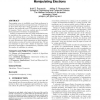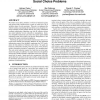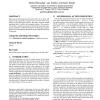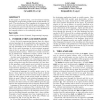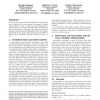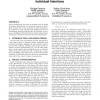113
Voted
ATAL
2006
Springer
15 years 4 months ago
2006
Springer
It is self-evident that in numerous Multiagent settings, selfish agents stand to benefit from cooperating by forming coalitions. Nevertheless, negotiating a stable distribution of...
106
Voted
ATAL
2006
Springer
15 years 4 months ago
2006
Springer
Encouraging voters to truthfully reveal their preferences in an election has long been an important issue. Previous studies have shown that some voting protocols are hard to manip...
89
Voted
ATAL
2006
Springer
15 years 4 months ago
2006
Springer
Preferences of a single agent are often partially ordered. For example, it may be hard to compare a novel with a biography. In such a situation, the agent may want the novel and t...
97
Voted
ATAL
2006
Springer
15 years 4 months ago
2006
Springer
We present a novel method for automatically acquiring strategies for the double auction by combining evolutionary optimization together with a principled game-theoretic analysis. ...
ATAL
2006
Springer
15 years 4 months ago
2006
Springer
We model social choice problems in which self interested agents with private utility functions have to agree on values for a set of variables subject to side constraints. The goal...
73
Voted
ATAL
2006
Springer
15 years 4 months ago
2006
Springer
Detecting and preventing the adversarial action of an agent with respect to the community of agents can be a serious issue in the design of open multi-agent systems. This task is ...
ATAL
2006
Springer
15 years 4 months ago
2006
Springer
In this paper we present Mob, a service-oriented scripting language for programming mobile agents in distributed systems. The main feature of the language is the integration of th...
121
Voted
ATAL
2006
Springer
15 years 4 months ago
2006
Springer
In multi-agent systems, social commitments are increasingly used to capture roles, social norms, the semantics of agent communication as well as other inter-agent dependencies. Th...
114
click to vote
ATAL
2006
Springer
15 years 4 months ago
2006
Springer
Social commitments have been increasingly used to model inter-agent dependencies and normative aspects of multiagent systems such as the semantics of agent communication. However,...
103
click to vote
ATAL
2006
Springer
15 years 4 months ago
2006
Springer
Emotion is an essential element of human behavior. Particularly in stressful situations such as combat, it is at least as important as rational analysis in determining a participa...

